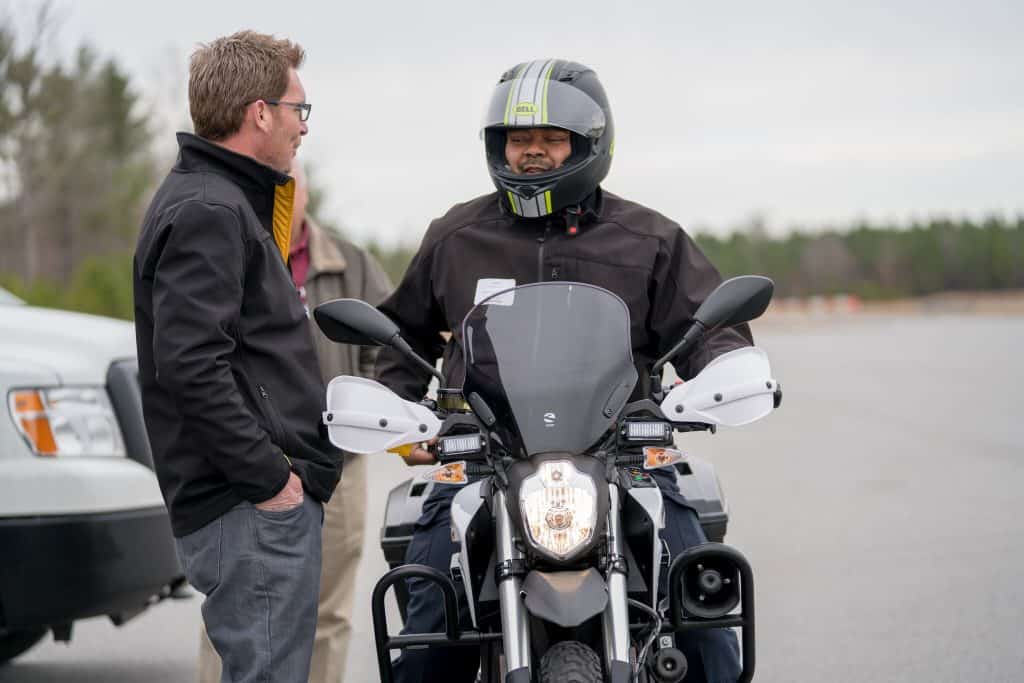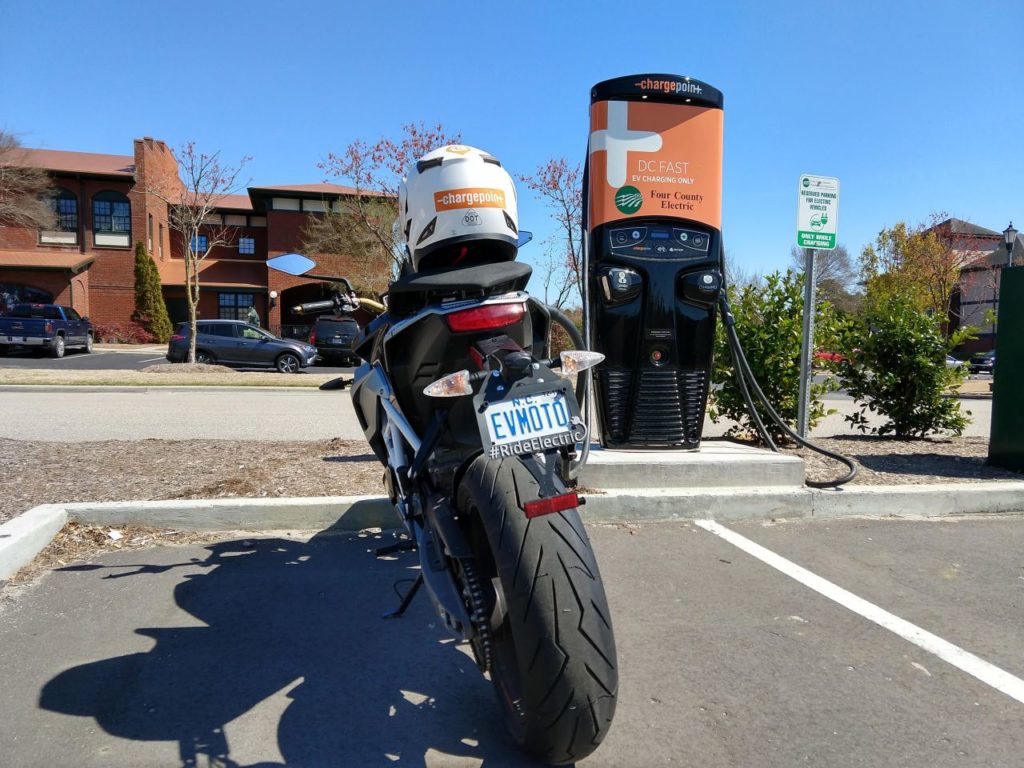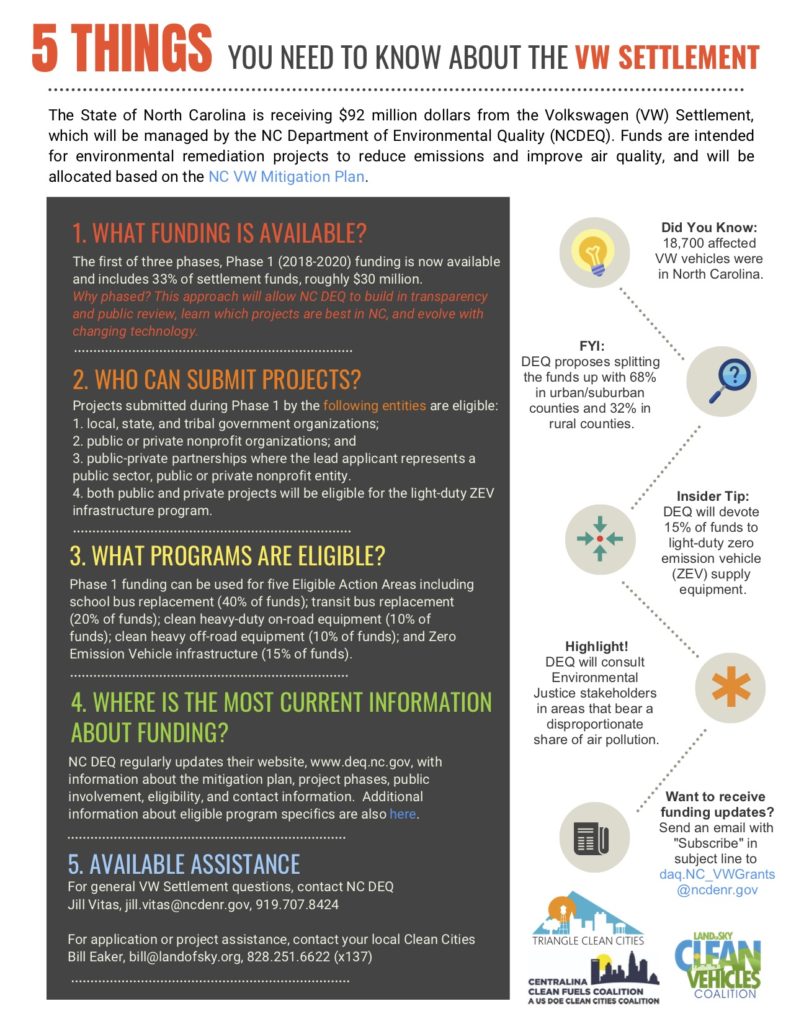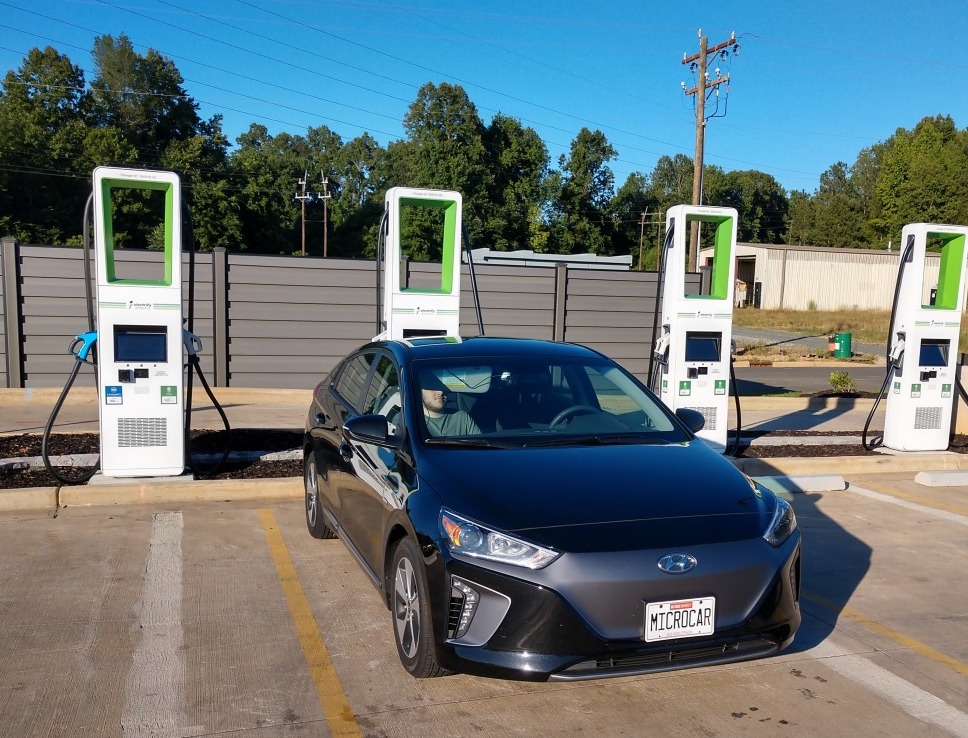Learn more about Battery Electric Vehicles (BEVs) and Plug-in Electric Vehicles available on the market by checking out our new 2019/2020 North Carolina Electric Vehicle Marketplace Fact Sheets below!
Battery Electric Vehicles (BEVs) – Fact Sheet
Learn more about Battery Electric Vehicles (BEVs) and Plug-in Electric Vehicles available on the market by checking out our new 2019/2020 North Carolina Electric Vehicle Marketplace Fact Sheets below!
Battery Electric Vehicles (BEVs) – Fact Sheet
By the Kerr-Tar Regional Council of Governments’ (KTRCOG) Planning Department
Venue
The Kerr-Tar Regional Council of Governments’ (KTRCOG) Planning Department facilitated an Alternative Fuel Vehicles workshop on Thursday, December 5, 2019. The three and one-half hour workshop occurred at Council of Governments headquarter located at 1724 Graham Avenue, Henderson, NC. The goal of KTRCG is to promote regionalism that provides opportunities for local governments to enhance and improve the quality of life for citizens through the effective delivery of services and programs.
Workshop Purpose
The workshop educated local governments and the public about clean energy alternative fuel solutions and technologies that help reduce transportation-related emissions and air pollutants. Participants received information that allowed them to make informed decisions about implementing alternative fuel use into their department fleet of vehicles and daily lives.
Speaker Lineup
The workshop featured four dynamic presentations from NC Clean Energy Technology Center (NCCETC) Program Director Rick Sapienza, Alliance AutoGas Municipal and Law Enforcement Specialist Mike Phillips, Blue Arrow Telematics Major Account Consultant Melvin McNeill, and Tesla Advisors Gabriella Kuznik and Kristin Landrum. The workshop culminated with a video from U.S. House of Representatives Congressmen G.K. Butterfield, D-NC 1st District.
NC Clean Energy Technology Center
Rick Sapienza gave attendees an overview of the services that NCCETC provides. Sapienza’s presentation discussed ways that attendees could procure funding opportunities for clean transportation vehicles and infrastructure. Sapienza also stated the importance of capitalizing on alternative fuel and advanced transportation technology incentives to cut costs and reduce emissions.
Alliance AutoGas
Mike Phillips discussed the seven components of a successful Autogas Program. Phillips emphasized using a top-down buy-in approach to implement a turnkey operation in local government department fleets that cut fuel and maintenance costs, while reducing emissions.
Blue Arrow Telematics
Melvin McNeill discussed vehicle safety and data solutions for law enforcement offered through using telematics. Participants gleaned a better understanding of the role telematics plays in driver safety implementation and best practices. The examples McNeill provided as to why government entities should integrate telematics, technology and data solutions into their fleets resonated with workshop attendees.
Tesla
Gabriella Kuznik and Kristin Landrum of Tesla discussed their new product line and electric vehicle technologies coming down the pipeline. From their presentation, attendees realized the role that electric vehicles play in the reduction of emissions. Also, they did an analysis breakdown, putting into perspective the affordability of a Tesla for the average consumer.
The CCC Approach (Combating Climate Change)
Congressman Butterfield stated the importance of using biofuels to produce crops in rural communities to combat climate change. The House of Representatives has a goal of attaining zero net emissions, leaving the country carbon-free by 2050. This objective parallels Governor Cooper’s Executive Order 80 initiative to reduce global warming.
Conclusion
Overall, the Alternative Vehicles Workshop was a success. Evaluation results suggest that participants gained a better understanding of how the transportation sector is the primary direct path to address climate change. Using alternative fuels ensures the reduction of negative emissions.
Last week, the NC Clean Energy Technology Center celebrated National Drive Electric Week 2019 with six events in Raleigh at NC State University, Winston-Salem at Wake Forest University, and Pittsboro, NC! Check out the photos from the events below.
NC State Football Tailgate & Expo (Photos by Nicole Deck)
Centennial Campus Expo + Ride & Drive (Photos by Nicole Deck)
Driver Meet-Up + Ride & Drive (Photos by Nicole Deck)
Winston-Salem events at Wake Forest University (Photos by Matt Abele)
Downtown Pittsboro Expo (Photos by John Bonitz)
Join the NC Clean Energy Technology Center, Centralina Clean Fuels Coalition and Triangle J Council of Governments for two Clean Transportation Demonstration Days this October 8 & 9!
Register for the Oct. 8 Concord event here, and register for the Oct. 9 Raleigh event here.

Executive Order 80 calls for the State of North Carolina to protect its environment while growing clean energy technologies. The order “affirms North Carolina’s commitment to reducing statewide greenhouse gas emissions to 40% below 2005 levels, calls for a 40% reduction in energy consumption in state-owned buildings, and calls for an increase in registered, zero-emission vehicles (“ZEVs”) to at least 80,000 – all by year 2025.”
Clean Transportation Demonstration Days support Executive Order 80 and give government entities across North Carolina information and experience with clean transportation technologies. The day will consist of classroom instruction with real-world case study results, hands-on product static review, networking, and a closed-course ride and drive for those who wish to participate.
Classroom instruction will include alternative fuel options, telematics and other new technologies, safety and more. There will be a diverse display of vehicles including a Nissan LEAF, Chevrolet Bolt, Chrysler Pacifica, police vehicle and fire truck, Zero Motorcycle and more. Lunch will be provided.
*Note: The event is only open to government entities and utilities.
For any questions, contact Rick Sapienza at resapien@ncsu.edu or 919-515-2788 (office)/ 919-332-4510 (cell).
Register for the Oct. 8 Concord event here, and register for the Oct. 9 Raleigh event here.
Join the NC Clean Energy Technology Center for National Drive Electric Week 2019! We will have six events located in Winston-Salem, Pittsboro and Raleigh, NC, including vehicle expos/tailgates, ride and drives, and driver meet-ups. Visit www.DriveElectricWeek.org to find an event near you!
—
Electric Vehicle Car Show & Tailgate, 4-6 p.m. Friday, September 13 in Winston-Salem, BB&T Field: Join us to kick off National Drive Electric Week at Wake Forest University in Winston-Salem with a tailgate and plug-in electric vehicle car show at the Wake Forest Vs. UNC Chapel Hill football game! Kick-off is at 6 p.m. on Friday, September 13. The vehicles will be located in front of the Bridger Field House.
(For game day on Friday, due to the congestion and traffic, if you do not have tickets for the game or parking arrangements, it is not advised that you come visit the plug-in electric vehicle show. )
Register here.
—
Driver Meet-Up, Car Show + Ride & Drive, 10 a.m.-2 p.m. September 14 in Winston-Salem, BB&T Field: On Saturday, September 14 from 10 a.m. to 2 p.m., bring your plug-in vehicle to a driver meet-up, car show and ride and drive, which is open to the public. The vehicles will be located in the Gold Parking Lot across from Bridger Field House.
Register here.
—
Electric Vehicle Car Show + Ride & Drive on Thursday, September 19 from 11 a.m. to 2 p.m.: Join us for a car show and ride & drive at Venture Plaza on NC State University’s Centennial campus. For this lunchtime event, there will be food trucks, static EVs and PHEVs to look at as well as test-drive. If you are an owner, there will be room for up to 10 static vehicles for the static car show. Owners are also welcome to participate in the ride & drive portion of the event.
For those who just want to visit and are not part of the Centennial Campus community, pay public parking is available in front of the Hunt Library. This is the same venue as the spring 2019 Earth Day event and will be a similar setup. Come on out have lunch and learn about driving on electricity!
Register here.
—
Driver Meet-Up & Car Show on Friday, September 20 from 5:30 p.m. to 7:30 p.m.: Join us for a plug-in electric vehicle driver meet-up, car show, and ride & drive outside the Close-King Indoor practice facility at the corner of Westchase Boulevard and Peter Karmanos Jr. Drive, next to Carter Finley Stadium. Bring your plug-in vehicle. Open to the public.
Register here.
—
Electric Vehicle Show & Tailgate on Saturday, September 21, time TBD: Join us for a tailgate and plug-in electric vehicle car show outside the Close-King Indoor practice facility at the corner of Westchase Boulevard and Peter Karmanos Jr. Drive, next to Carter-Finley Stadium. Come learn about electric, plug-in hybrid electric and hybrid electric vehicles, as well as register for a chance to win NC State University Football prizes!
(For game day on Saturday, due to congestion and traffic, if you do not have tickets for the game or parking arrangements, it is not advised that you come visit the plug-in electric vehicle show.)
—
Electric Vehicle Car Show at Pepperfest, Downtown Pittsboro, 3-6 p.m. Sunday, September 22: Join us at the 2019 Pepper Festival in Downtown Pittsboro to check out a display of plug-in electric and hybrid vehicles, and talk to us to learn more about them.
—
Learn more and find an event near you at www.DriveElectricWeek.org!
Considering alternative fuels for your fleet? Learn more about electric vehicles!
We visited the University of North Carolina at Charlotte last year to talk to Chris Facente, Automotive and Motor Fleet Supervisor, about the university’s fleet of electric vehicles. Check out our video on it here.
The University of North Carolina at Charlotte has 115 electric vehicles on its campus, including Polaris GEMs and Nissan Leafs. Facente said they’d like their fleet to be 25 percent electric in about two years.
Electric vehicles are cheaper to run because they don’t require gas and require less maintenance – and they produce no harmful emissions.
Learn more about electric vehicles and if this option could be right for your fleet at www.cleantransportation.org.
It’s National Drive Electric Week! Are you interested in learning more about electric and hybrid vehicles?
Join the NC Clean Energy Technology Center for National Drive Electric Week at NC State University in Raleigh, September 19-21!
Electric Vehicle Car Show + Ride & Drive on Thursday, September 19 from 11 a.m. to 2 p.m.: Join us for a car show and ride & drive at Venture Plaza on NC State University’s Centennial campus. For this lunchtime event, there will be food trucks, static EVs and PHEVs to look at as well as test drive. If you are an owner, there will be room for up to 10 static vehicles for the static car show. Owners are also welcome to participate in the ride & drive portion of the event. For those who just want to visit and are not part of the Centennial Campus community, pay public parking is available in front of the Hunt Library. This is the same venue as the spring 2019 Earth Day event and will be a similar setup. Come on out have lunch and learn about driving on electricity!
Register here.
Driver Meet-Up & Car Show on Friday, September 20 from 5:30 p.m. to 7:30 p.m.: Join us for a plug-in electric vehicle driver meet-up, car show, and ride & drive outside the Close-King Indoor practice facility at the corner of Westchase Boulevard and Peter Karmanos Jr. Drive, next to Carter Finley Stadium. Bring your plug-in vehicle. Open to the public.
Register here.
Electric Vehicle Show & Tailgate on Saturday, September 21, time TBD: Join us for a tailgate and plug-in electric vehicle car show outside the Close-King Indoor practice facility at the corner of Westchase Boulevard and Peter Karmanos Jr. Drive, next to Carter-Finley Stadium. Come learn about electric, plug-in hybrid electric and hybrid electric vehicles, as well as register for a chance to win NC State University Football prizes!
*For game day on Saturday, due to the game day congestion and traffic, if you do not have tickets for the game or parking arrangements, it is not advised that you come visit the plug-in electric vehicle show.
Learn more at www.DriveElectricWeek.org!
Join us for an Alternative Fuel Vehicle Tailgate before the Durham Bulls baseball game on Saturday, July 13 from 5:30-6:35 p.m. outside of the Durham Bulls Athletic Park stadium! Check out a lineup of alternative fuel vehicles, which may include electric, hybrid/plug-in hybrid electric, propane, natural gas, biodiesel or ethanol.

Are you interested in installing new Electric Vehicle Supply Equipment (EVSE) (electric vehicle charging stations) in your North Carolina community? There are three possible sources of funding to make it happen.
EVSE; an element in an infrastructure that supplies electric energy for recharging of plug-in electric vehicles including electric cars, neighborhood electric vehicles and plug-in hybrids; is deployed throughout the country in key areas for public charging as a supplement to residential charging, according to the US Department of Energy Alternative Fuels Data Center.
There are three types of electric vehicle chargers – Level 1, Level 2 and DC Fast Charging. Types are classified by the rate at which the batteries are charged. Level 1 provides 2-5 miles of range per 1 hour of charging, Level 2 provides 10-20 miles of range per 1 hour of charging, and DC Fast Charging provides 60-80 miles of range per 20 minutes of charging. Learn more about each type of equipment and developing infrastructure to charge plug-in electric vehicles at the US Department of Energy Alternative Fuels Data Center website here. You can also view the current map of EV chargers in the United States and Canada here.
There are three potential sources of funds to support installation of EVSE in North Carolina:
1. The VW Settlement gives North Carolina $92 million dollars for projects to reduce vehicular air pollution. These funds will be administered by NC DEQ as a part of their beneficiary mitigation plan. Fifteen percent of these funds will be allotted for EVSE (both Level 2 and DC Fast Chargers).

The NCDEQ just released a Request For Proposals (RFP) for VW settlement funds for DC Fast chargers this week. Under the DC Fast Charge program:
• $3.4 million will be available for the installation of Zero Emission Vehicle (ZEV) Charging Infrastructure
• Projects in designated corridors will receive priority to expand the state’s charging infrastructure network
• Projects can be submitted by eligible businesses, incorporated nonprofits, and state, local, tribal or municipal government agencies
Applications will be available on July 1, 2019, and the submission deadline is September 30, 2019. The Zero Emission Vehicle (ZEV) Level 2 Charging program RFP will be released at a later date. Read more about the NCDEQ RFPs here.
2. The NC Clean Energy Technology Center’s Clean Transportation team also has limited grant funding for EVSE. The next Clean Fuels Advanced Technology (CFAT) project RFP will be released in the fall or winter of 2019. Funding will be restricted to projects where there is no ground disturbance involved (such as in a parking deck or where wires and conduit are already in place) – and no digging, trenching, pavement cutting, repaving, etc. is allowed. Take a look at the last round of funding for insights on what the next round may look like, and join the newsletter list to know when the next RFP will be issued by going here. For more information on CFAT funding, contact John Bonitz at jhbonitz@ncsu.edu.

3. Duke Energy plans to invest $76 million to help spur EV adoption across the state, according to Duke Energy. Duke Energy’s proposal to the NC Utilities Commission would help fund the adoption of electric school buses and electric public transportation, and lead to almost 2,500 new charging stations in the state – more than doubling the amount of public stations currently in North Carolina, according to Duke Energy. The initiative is to help meet Gov. Roy Cooper’s executive order goals of having 80,000 electric vehicles registered in the state and to reduce the state’s carbon footprint by 40 percent below 2005 levels within the next six years. Duke Energy’s plan includes:
• Residential EV Charging: This program will provide a $1,000 rebate for qualifying Level II charging stations for up to 800 residential customers. Level II charging allows customers to charge their EVs up to six times faster than a standard wall outlet.
• Public Charging: Duke Energy will install and operate more than 800 public charging stations across North Carolina, including DC Fast Charging, Public Level II and multifamily locations, which will expand the state’s network of EV charging stations.
• Fleet EV Charging: The program will provide a $2,500 rebate for 900 qualifying charging stations for commercial and industrial customers who operate fleets that are transitioning to electric and plug-in hybrid vehicles. Municipalities and universities also qualify for these rebates.
• EV School Bus Charging Station: Duke Energy will provide financial support to eligible customers to procure up to 85 electric school buses. Duke Energy will install the associated charging infrastructure.
• EV Transit Bus Charging Station: Duke Energy will install and operate more than 100 electric transit bus charging stations for eligible transit agencies electing to procure electric buses. Electric transit buses eliminate diesel emissions and reduce fuel and maintenance costs for transit agencies.”
Source: Duke Energy
Source of electricity is taken into consideration in scoring CFAT grant proposals, with renewable-sourced energy scoring higher. The NC DEQ VW Settlement program will give up to 10 bonus points when RECs are purchased to offset grid electricity purchases. The Duke Energy program is still in early stages of proposal and development, and it is not yet clear what their criteria will be.
For any questions on Duke Energy’s EVSE initiatives, contact Lisa Poger at Lisa.Poger@duke-energy.com.